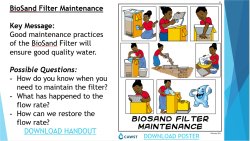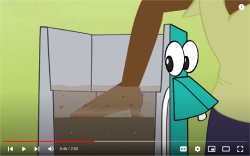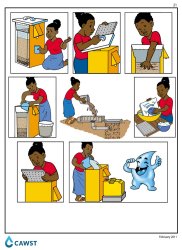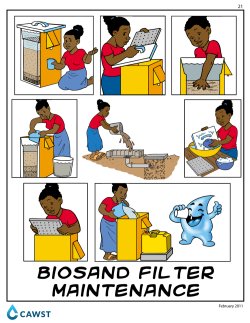
|
 Contact UsDrop of Hope BioSand Filters
English/Efik Grow and Go curriculumDrop of Hope School ProjectEnglish Child EvangelismKids Discipleship TrainingAfrican Countries SelectedCARICOM Countries SelectedMore English UCT Curriculum |
home>>drop of hope>>introduction>>installation>>maintenance Drop of Hope - Filter Maintenance Embedded Microsoft Office presentation, powered by Office.
Stage H: Maintenance Ideally, and with practice, you should be able to use the right amounts of water and sand so that once you have added all the sand, the water level is exactly at the top of the sand and there is no dry sand on top. *Note: after you pour a bucket of water into the filter, the water level will be at its normal level: 4-6 cm above the top of the sand. Where you draw the line on the inside of the filter to show where the top of the sand should be will also depend on the size of the mold. It should be roughly 4-6 cm below where the normal standing water level will be, or 4-6 cm below the level of the end of the outlet tube. When the water stops flowing, check the depth of the water above the sand. The water should be between 4 and 6 cm deep (1.5 to 2.5"). 5. Check the flow rate Tools and Materials
|
|
Using a measuring container If you are using a measuring container, collect water for exactly 1 minute.
• If you get more than 450 mL per minute, the sand was washed too much. You need to reinstall the filter with different sand. WHAT IF THE FLOW RATE IS TOO SLOW? If the flow rate is less than 400 mL/minute, the filter will still work. But users may not like a slow flow rate. The flow rate will get even slower as they use the filter because the top of the sand clogs with dirt. If the flow rate gets too slow, they may stop using the filter. If the flow rate is too slow after you install the filter, you can try to make it faster by cleaning the top of the sand. Do a Swirl and Dump. Swirl the top of the sand with your hand. Then use a cup to dump out the dirty water in the top of the filter. Swirl and Dump
If the flow rate is not faster after doing 4 "Swirl and Dump", you must wash all the sand more. Take all the sand out of the filter. Take the sand back to be washed again. Do another jar test. Install 1 filter and test the flow rate. Tell the people who wash the sand that it has not been washed enough, so they can adjust their washing method. Reinstall the filter in the home with new gravel and sand that has been washed more. Check the flow rate again. WHAT IF THE FLOW RATE IS TOO FAST? If the flow rate is more than 400 mL/minute, the filter might not work as well. It might not remove as many pathogens from the water. If the flow rate is higher than 450 mL/minute, you should replace the sand. Take all the sand out of the filter. Start with new sand and wash it less. Do a jar test. Install 1 filter and test the flow rate. Tell the people who wash the sand, so they know they are washing it too much. Reinstall the filter with the new sand and gravel. Check the flow rate again. Download English Handout #13 - Educating the user to Check the Flow Rate (To be translated into Efik)
Key Message: Good maintenance practices of the biosand filter will ensure good quality water. Possible Questions: • How do you know when you need to maintain the filter? • What has happened to the flow rate? • How can we restore the flow rate? Content: The flow of the filter will decrease over time because of clogging of the sand layer by sediment in the untreated water. We need perform maintenance when the flow rate of the filter is too slow. How often depends on how dirty the untreated water is. To restore the flow rate, we: • Remove the filter lid • If there is no water present above the diffuser plate, add about 4 litres (1 gallon) of water • Remove the diffuser plate • Using the palm of your hand, lightly touch the very top of the sand and move your hand in a circular motion; be careful to not mix the top of the sand deeper into the filter • Scoop out the dirty water with a small container • Dump the dirty water outside the house in soak pit or garden • Repeat the maintenance task until the flow rate has been restored • Make certain the sand surface is smooth and level • Replace the diffuser plate • Wash your hands with soap and water • Refill the filter and set up the water storage container to collect the clean water The biolayer has been disturbed by the maintenance, but it will re-grow. It is important to continue disinfecting the filtered water. If you find the flow rate of the filter decreases rapidly, sediment your source water before pouring it into the filter. You should also monitor the sand level and take care of the sand. Check the standing water level, the sand should be 5cm (2 inches) below the standing water level. If you are still having problems with your filter after cleaning it, contact the filter manufacturer or your community health promoter. Check for Understanding: • Show me how to operate and maintain the filter. • How often do you need to perform maintenance? • Why is it necessary to continue disinfecting the filtered water after cleaning the filter? Information sourced from CAWST.org HANDOUT:Download English Handout #12 - Maintenance Check the flow rate (To be translated into Efik) Educate the user how to Flush the Filter SOWING SEEDS OF SUCCESS - MORINGA CURRICULUM
SUPER FRUIT CURRICULUM NEW LIFE CURRICULUM
|
| Copyright © 2024 www.UnitedCaribbean.com. All rights reserved. Disclaimer Click to Contact us |






















































